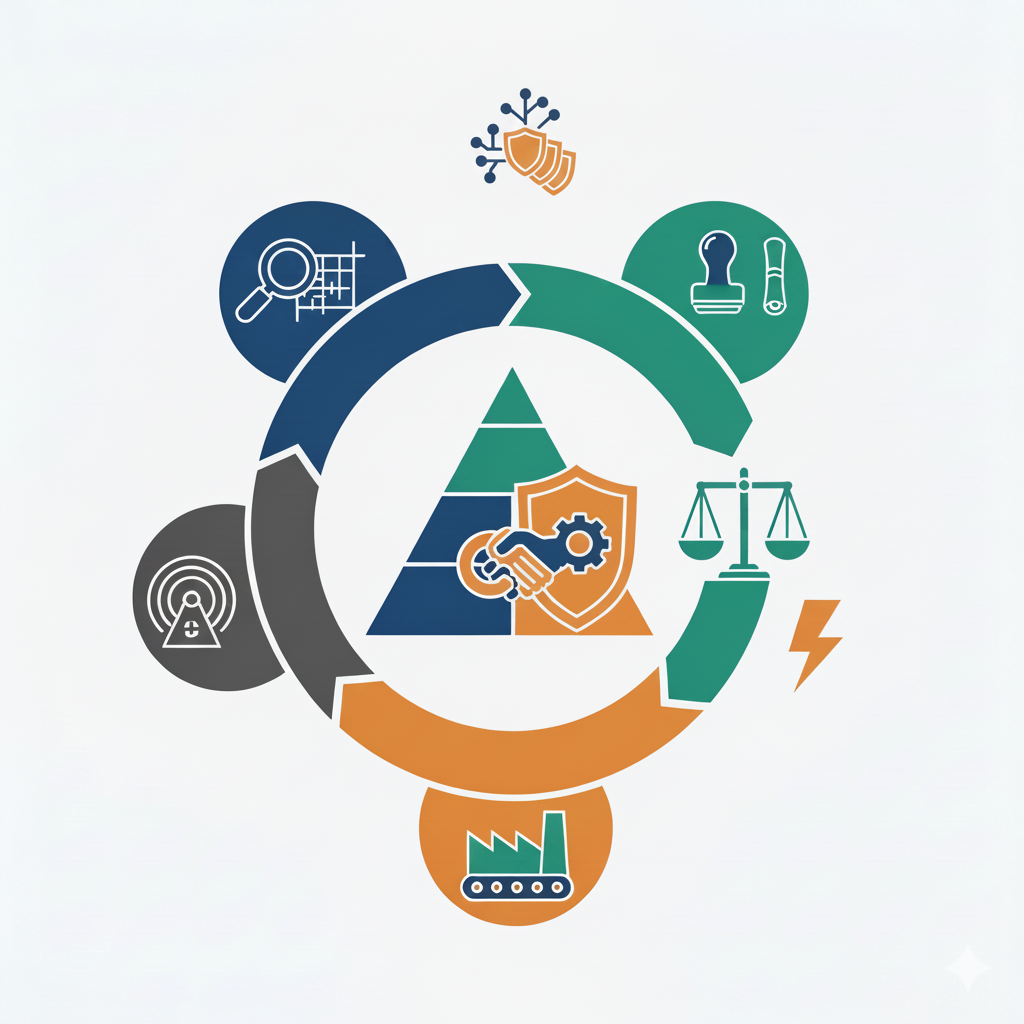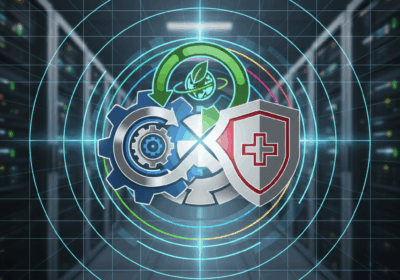Supply Chain Risk Management: Third- Party Vendor Auditing Best Practices

Supply Chain Risk Management: Third-Party Vendor Auditing Best Practices
Supply chain risk management has evolved from basic vendor qualification processes to sophisticated risk assessment and mitigation programes that address the complex interdependencies characterising modern critical infrastructure projects. As organisations increasingly rely on specialised third-party vendors for everything from critical components to essential services, the potential for supply chain disruption to cascade through entire project lifecycles has grown exponentially.
Through our partnership with ASafe Global and extensive experience across data centres, industrial facilities, and energy infrastructure, we have observed that effective third-party vendor auditing requires comprehensive approaches that go far beyond traditional financial and capability assessments. Organisations that develop robust vendor auditing programes consistently achieve superior project outcomes whilst avoiding costly disruptions and compliance failures that emerge from inadequate supply chain oversight.
The challenge lies not merely in identifying qualified vendors, but in establishing ongoing relationships that maintain quality, compliance, and performance standards throughout extended project lifecycles. Many organisations continue to treat vendor auditing as procurement activities rather than recognising vendor management as ongoing risk management that affects operational performance for years or decades after initial selection decisions.
Understanding Supply Chain Complexity
Modern critical infrastructure projects involve intricate supply chains that extend across multiple tiers of suppliers, geographic regions, and regulatory jurisdictions. This complexity creates interdependencies where failures in seemingly minor supply chain elements can compromise entire project outcomes.
Multi-Tier Supply Chain Dependencies
Primary vendors increasingly rely on networks of sub-suppliers and specialist providers that may not be visible to principal contractors or project owners. These hidden dependencies create risks that traditional vendor qualification processes often miss, as they focus on direct relationships whilst overlooking critical supply chain elements that operate several tiers removed from primary contracts.
Understanding supply chain depth requires systematic mapping of vendor relationships and dependencies that extends beyond immediate contractual arrangements. Effective vendor auditing programmes must address not only direct vendors but also key suppliers within vendor networks that could affect project outcomes if they experience difficulties or performance problems.
Geographic concentration within supply chains creates additional risks where multiple vendors rely on suppliers from the same regions or facilities. Natural disasters, political instability, or regulatory changes in these concentrated areas can simultaneously affect multiple vendors, creating correlated risks that compromise supply chain resilience.
Technology and Innovation Risks
Critical infrastructure projects increasingly incorporate innovative technologies and specialised components that may be available from limited supplier bases. These technology dependencies create risks where vendor difficulties or capacity constraints can compromise entire project approaches or force expensive design changes.
Intellectual property considerations complicate vendor auditing for technology-intensive projects where vendors may be reluctant to provide comprehensive operational transparency. Balancing due diligence requirements with vendor confidentiality concerns requires sophisticated approaches that achieve appropriate oversight without compromising competitive relationships.
Technology lifecycle considerations affect long-term vendor relationships where components or systems may require ongoing support, updates, or replacement throughout extended operational periods. Vendor auditing must assess not only current capabilities but also long-term viability and commitment to supporting deployed technologies.
Regulatory and Compliance Interdependencies
Third-party vendors operating across different jurisdictions must comply with varying regulatory requirements that affect their ability to deliver products and services consistently. Regulatory compliance failures by vendors can create project delays, compliance violations, or operational constraints for client organisations.
Industry-specific regulations create additional complexity where vendors must understand and comply with specialised requirements that may differ significantly from their primary business operations. Data centre vendors, for example, must understand both construction regulations and information security requirements that affect their service delivery.
Environmental and social governance requirements increasingly affect vendor selection and ongoing management as organisations become responsible for supply chain ESG performance. Vendor auditing must address ESG considerations whilst ensuring operational capability and compliance with project requirements.
Comprehensive Vendor Assessment Frameworks
Effective third-party vendor auditing requires systematic frameworks that address multiple risk categories whilst remaining practical to implement and maintain. These frameworks must evolve from simple pass-fail assessments to sophisticated risk evaluation and management systems.
Financial Stability and Business Continuity
Financial assessment forms the foundation of vendor auditing, yet traditional financial analysis often fails to identify emerging risks or structural weaknesses that could affect vendor performance. Comprehensive financial assessment must consider both current financial position and trends that indicate future viability and capacity.
Business continuity planning assessment evaluates vendor preparedness for operational disruptions that could affect service delivery. Vendors with robust business continuity plans and demonstrated recovery capabilities present lower risks than those without systematic approaches to operational resilience.
Insurance and liability coverage assessment ensures vendors maintain appropriate protection against operational risks that could affect client organisations. Inadequate insurance coverage can create financial exposure for client organisations if vendor failures result in project delays or performance problems.
Technical Capability and Quality Systems
Technical assessment must evaluate both current capabilities and capacity for future performance improvement. Vendors that demonstrate continuous improvement in technical capabilities provide better long-term value than those with static operational approaches.
Quality management system assessment determines whether vendors maintain systematic approaches to quality control that align with project requirements and client expectations. ISO 9001 certification provides baseline assurance, but assessment must consider how quality systems address project-specific requirements.
Innovation capability assessment becomes increasingly important for long-term vendor relationships where evolving technology and performance requirements may require ongoing adaptation and improvement. Vendors that invest in research and development provide better long-term value than those focused solely on current operations.
Operational Performance and Delivery Track Record
Historical performance analysis provides insights into vendor reliability and consistency that financial and technical assessments may miss. Performance trends across multiple projects and client relationships indicate vendor capability to meet commitments consistently.
Reference verification must go beyond simple reference checks to include detailed discussions with previous clients about vendor performance, problem resolution capabilities, and relationship management effectiveness. Comprehensive reference verification identifies both strengths and potential concerns that affect vendor selection decisions.
Capacity assessment evaluates vendor ability to handle project requirements without compromising performance for other clients or overextending operational capabilities. Vendors operating at capacity limits present higher risks than those with appropriate operational margins.
Risk-Based Auditing Methodologies
Effective vendor auditing requires risk-based approaches that focus assessment resources on highest-risk vendors and most critical supply chain elements. These methodologies must balance comprehensive assessment requirements with practical resource constraints.
Risk Categorisation and Prioritisation
Vendor risk assessment must consider both impact potential and probability of problems to prioritise auditing resources effectively. High-impact vendors require more comprehensive assessment than low-risk suppliers, whilst vendors with concerning risk indicators require more frequent monitoring regardless of their project importance.
Critical path analysis identifies vendors whose performance directly affects project schedules or critical operational capabilities. These vendors require enhanced assessment and ongoing monitoring compared to vendors providing non-critical goods or services.
Single-source vendors present elevated risks that require comprehensive assessment and ongoing monitoring. Projects dependent on single vendors for critical components or services must develop contingency plans and enhanced relationship management to address potential supply chain disruptions.
On-Site Assessment and Verification
Physical facility assessment provides insights into vendor operational capabilities that cannot be obtained through documentation review or remote assessment. On-site visits enable verification of operational claims whilst identifying potential concerns not apparent in vendor presentations.
Quality system implementation verification ensures vendor quality management systems operate effectively in practice rather than simply existing on paper. Observing actual operational processes provides more reliable assessment than reviewing documentation alone.
Staff competency and training assessment during site visits identifies whether vendor personnel possess appropriate skills and knowledge to deliver project requirements consistently. Staff capability assessment often reveals implementation weaknesses not apparent in management presentations.
Ongoing Monitoring and Performance Tracking
Vendor performance monitoring must continue throughout project lifecycles rather than ending after initial qualification. Ongoing assessment identifies emerging problems early when corrective action remains practical and cost-effective.
Key performance indicator tracking provides objective measurement of vendor performance against established standards. Performance trends enable proactive intervention before problems affect project outcomes or client satisfaction.
Relationship management assessment evaluates vendor responsiveness, communication effectiveness, and problem-solving capabilities that affect ongoing project success. Strong relationship management capabilities often compensate for minor operational weaknesses, whilst poor relationship management can compromise otherwise capable vendors.
Specialised Assessment Considerations
Different types of vendors and projects require specialised assessment approaches that address industry-specific risks and requirements. Generic auditing frameworks often miss critical considerations that affect vendor performance in specialised contexts.
Technology and Equipment Suppliers
Technology suppliers require assessment of both current product capabilities and ongoing support commitments that extend throughout equipment lifecycles. Support capability assessment must consider both technical capabilities and business continuity planning that ensures ongoing support availability.
Cybersecurity assessment becomes critical for technology suppliers whose products may create security vulnerabilities or require ongoing security updates. Vendor cybersecurity practices directly affect client security posture and regulatory compliance capabilities.
Integration capability assessment evaluates vendor ability to support product integration with other systems and technologies. Poor integration capabilities can create project delays and ongoing operational complications that exceed initial product performance considerations.
Professional Services Providers
Professional services assessment must evaluate both individual competencies and organisational capabilities that affect service delivery quality and consistency. Personnel stability and succession planning affect long-term service quality and client relationship continuity.
Industry expertise assessment determines whether service providers understand sector-specific requirements and regulatory frameworks that affect service delivery. Generic service providers may lack industry knowledge necessary for effective performance in specialised contexts.
Knowledge management capabilities affect service providers’ ability to maintain service quality and continuity despite personnel changes. Effective knowledge management systems enable consistent service delivery whilst poor knowledge management creates dependency on individual personnel.
Construction and Installation Contractors
Safety management system assessment becomes critical for construction contractors where safety performance affects both project outcomes and regulatory compliance. Contractors with robust safety management systems present lower risks and typically achieve better overall project performance.
Environmental management capability assessment ensures contractors can meet environmental compliance requirements whilst maintaining productivity and schedule performance. Environmental management failures can create substantial project delays and regulatory complications.
Subcontractor management assessment evaluates contractor capability to manage their own supply chains effectively. Poor subcontractor management often creates performance problems that affect overall project outcomes despite contractor competency.
Documentation and Audit Trail Management
Comprehensive vendor auditing requires systematic documentation that supports both ongoing vendor management and regulatory compliance requirements. Documentation systems must balance thoroughness with practical usability for ongoing vendor relationship management.
Assessment Documentation Standards
Audit documentation must provide sufficient detail to support vendor selection decisions whilst remaining accessible for ongoing reference and periodic review. Standardised documentation formats enable consistent assessment across different vendor categories and assessment teams.
Evidence collection and verification procedures ensure audit findings can withstand scrutiny from internal management, external auditors, or regulatory bodies. Documentation standards must address both assessment procedures and evidence retention requirements.
Risk assessment documentation must clearly articulate identified risks, mitigation measures, and ongoing monitoring requirements. Clear risk documentation enables effective ongoing vendor management and provides foundation for periodic reassessment and relationship adjustments.
Performance Tracking and Reporting
Performance documentation systems must capture both quantitative metrics and qualitative observations that affect vendor relationship management. Balanced performance tracking provides comprehensive insight into vendor capabilities and areas requiring attention.
Trend analysis capabilities enable identification of improving or declining vendor performance patterns that require management attention. Performance trends often provide early indicators of problems before they affect project outcomes or client satisfaction.
Management reporting systems must provide appropriate information for different stakeholder groups including procurement teams, project managers, and senior management. Reporting systems must balance comprehensive information with practical usability for decision-making purposes.
Continuous Improvement and Relationship Development
Effective vendor auditing extends beyond assessment and selection to include ongoing relationship development that improves vendor performance whilst reducing supply chain risks. Continuous improvement approaches create value for both client organisations and vendor partners.
Collaborative Improvement Planning
Joint improvement planning with vendors creates shared commitment to performance enhancement that benefits both parties. Collaborative approaches often achieve better outcomes than adversarial relationships focused solely on compliance and cost reduction.
Best practice sharing between client organisations and vendors enables mutual learning that improves overall supply chain performance. Vendors often possess expertise and insights that can benefit client operations whilst client feedback enables vendor improvement.
Long-term relationship development creates vendor commitment that extends beyond individual contracts to include ongoing capability development and client support. Strong vendor relationships often provide competitive advantages through preferential access to vendor capabilities and innovations.
Vendor Development Programmes
Capability development support helps vendors improve their operations whilst ensuring they can meet evolving client requirements. Vendor development investments often provide better returns than frequent vendor changes that require ongoing selection and qualification activities.
Training and competency development collaboration ensures vendor personnel understand client requirements and expectations whilst developing capabilities that support improved performance. Joint training programmes often prove more effective than separate training activities.
Technology and innovation collaboration enables vendors to develop capabilities that support client objectives whilst maintaining competitive advantages. Collaborative innovation often produces better outcomes than traditional client-supplier relationships focused primarily on cost management.
Future-Proofing Supply Chain Risk Management
Supply chain risk management continues evolving with increasing emphasis on resilience, sustainability, and digital transformation. Future-proofing requires anticipating these trends whilst building adaptable vendor management systems.
Digital Transformation and Automation
Digital supply chain management systems increasingly enable real-time monitoring and automated risk assessment that improve both efficiency and effectiveness of vendor management. Integration of vendor performance data with project management systems provides comprehensive oversight whilst reducing administrative burden.
Artificial intelligence and machine learning applications to vendor risk assessment enable identification of risk patterns and predictive insights that traditional assessment methods may miss. Advanced analytics can identify emerging risks before they affect vendor performance or project outcomes.
Blockchain and distributed ledger technologies offer potential for enhanced supply chain transparency and traceability that could transform vendor auditing and ongoing monitoring. Distributed verification systems may provide more reliable and efficient approaches to vendor assessment and performance tracking.
Sustainability and ESG Integration
Environmental, social, and governance considerations increasingly affect vendor selection and ongoing management as organisations recognise supply chain ESG performance as business risk and competitive advantage. ESG assessment must become integrated with traditional vendor auditing rather than treated as separate compliance activity.
Carbon footprint and environmental impact assessment of vendor operations affects both regulatory compliance and operational sustainability objectives. Climate change considerations increasingly influence vendor selection and long-term relationship development.
Social responsibility assessment including labour practices, community impact, and ethical business practices affects both regulatory compliance and reputational risk management. Comprehensive ESG assessment requires evaluation of vendor practices throughout their operations and supply chains.
The complexity of modern supply chains demands sophisticated approaches to third-party vendor auditing that address multiple risk categories whilst supporting ongoing relationship development and performance improvement. Organisations that recognise vendor auditing as strategic capability rather than procurement overhead consistently achieve superior project outcomes whilst building resilient supply chain relationships.
Our experience through the AuditCo and ASafe Global partnership continues to demonstrate that integrated approaches to vendor risk management deliver superior outcomes compared to fragmented assessment and management activities. As supply chains become increasingly complex and critical to project success, comprehensive vendor auditing capabilities become essential rather than optional organisational capabilities.
Success requires understanding that vendor auditing provides foundation for ongoing supply chain risk management and relationship development rather than simply procurement support. Organisations that embrace comprehensive vendor auditing create competitive advantages through superior supply chain performance and resilience that supports both immediate project success and long-term operational excellence.
For More Information Visit https://asafeglobal.com/ or contact info@auditco.com.au



